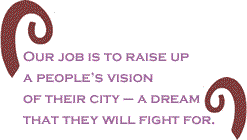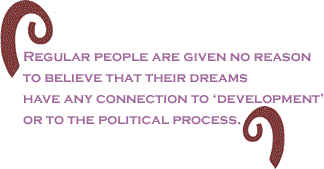
 Co-Publisher
Glen Ford delivered the following remarks to the Labor Plenary
at the Rainbow/PUSH Coalition 33rd Annual Conference, in Chicago,
Illinois, June 29. Co-Publisher
Glen Ford delivered the following remarks to the Labor Plenary
at the Rainbow/PUSH Coalition 33rd Annual Conference, in Chicago,
Illinois, June 29.
During the last couple years we’ve been hearing a lot about a “global
clash of civilizations.” We have our own clash of civilizations
going on, right here in the United States.
Essentially, civilization is the sum total
of the expressed dreams of a people. It is their version – and vision – of
what life is supposed to be.
But in the United States, only one very small
group is empowered to dream its dreams – to build its version
of civilization.

This group sees neighborhoods and cities and
countries – the whole
world – as its private Field of Dreams – places where they can
make ever-increasing profits, at ever-diminishing cost to themselves.
Forget about the rest of us.
 Wal-Mart is the “model” for this brand of civilization. They lock
up everybody else’s dreams in their Big Box. And, whatever they
do, no matter how destructive – they call that, “development.” Wal-Mart is the “model” for this brand of civilization. They lock
up everybody else’s dreams in their Big Box. And, whatever they
do, no matter how destructive – they call that, “development.”
Normal people, regular Americans, have their
own “civilized” dreams,
including people in the inner cities. They walk the streets of
their neighborhoods, saying:
“There oughta be an entertainment complex, right over there,” or…
“This is a perfect place for a restaurant – if they’d just move
the police station a little closer,” or…
“They need to build some housing, here – bring
some life to this area.”
What these everyday people are doing, is urban
planning. Normal people are keenly interested in development.
But regular people
are given no reason to believe that their dreams have any connection
to “development” – or to the political process. It’s just…day dreaming.
Instead, we have allowed corporations to decide the fate of the
cities. We hardly speak of democratic development. Even
now, as the cities become more valuable than they have been in
nearly a half-century, we still fail to tap the people’s dreams.

What we are left with, as a result – is Wal-Mart.
And, not just Wal-Mart, but the Wal-Mart “model” – which
is applauded on Wall Street and at the White House as the way
that American
corporations should operate.
If
we are to defeat the Wal-Mart model, we must become the enablers
of the
people’s dreams.
We must do that, by building a movement based
on democratic development – development
of the cities for the benefit of those who live in them.
We must give the people the tools, the information,
and access to specialized disciplines, so that they can dream – and
build – their city.
Labor is uniquely positioned to nurture such a movement, especially
Black labor.
The imbalance in the struggle against the Wal-Mart model is about
more than just money. It is also about information. Corporations
gather data all the time, for their own purposes. Yet no city in
this country has anything that could accurately be called an overall
plan for development. And no major American city has ever performed
a real audit of its assets, public and private.
Corporations hold all the information cards,
and manipulate all the numbers, because development is considered
the business of
business – not the people’s business.

That’s what we have to change, if we truly
want to beat the Wal-Mart model.
We must bring together real urban specialists
and planners, to do audits of the public and private assets of
the cities, to assess
the actual potentialities of these places – in close collaboration
with those activists who are daily grappling with corporate developers,
in localities all across this country.
For Black labor in particular, this is the
unfinished business of our people’s historical struggle.
Building a movement for democratic development
is also the context in which to discuss how union pension funds
should be invested – investments
that should be made with a larger Plan in hand: a democratic
plan for urban development.
In 1980, Ronald Reagan came to power with a
vision of a Shining City on a Hill. You and I know that Reagan’s vision did not
include us - that we didn’t even live in his imagined City
on a Hill.
Our job in the fight against the Wal-Mart model
is to raise up a people’s vision of their city – one that
shines in their imaginations – a
dream that they will fight for. Because, in the end, all great
movements are sustained by dreams.
The United Food and Commercial Workers union (UFCW)
played a key role in organizing the Labor Plenary at the Rainbow/PUSH
conference. |


